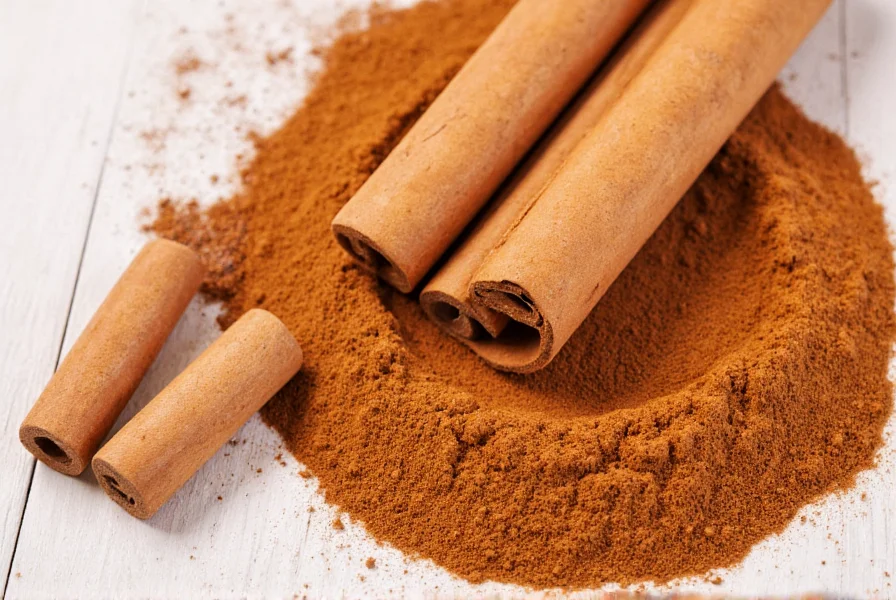For individuals exploring natural approaches to metabolic health, cinnamon supplements have gained significant attention in recent years. This comprehensive guide examines the scientific evidence behind cinnamon supplementation, differentiating between popular varieties and providing evidence-based recommendations for safe usage.
Understanding Cinnamon Supplement Varieties
Not all cinnamon supplements are created equal. The two primary types available commercially represent substantially different botanical origins and chemical compositions:
| Characteristic | Ceylon Cinnamon | Cassia Cinnamon |
|---|---|---|
| Also known as | "True" cinnamon | Chinese cinnamon |
| Primary source | Cinnamomum verum (Sri Lanka) | Cinnamomum cassia (China/Vietnam) |
| Coumarin content | 0.004-0.14 mg/g (very low) | 2.1-5.6 mg/g (high) |
| Market availability | Less common, typically more expensive | Most common in supermarkets |
| Recommended for supplementation | Preferred choice | Use with caution |
The critical distinction between these varieties lies in their coumarin content. Coumarin, naturally present in higher concentrations in Cassia cinnamon, has been associated with potential liver toxicity when consumed in substantial amounts over extended periods. European Food Safety Authority guidelines recommend limiting coumarin intake to 0.1 mg per kilogram of body weight daily.

Evidence-Based Health Benefits of Cinnamon Supplements
While cinnamon has been used traditionally for centuries, modern research provides specific insights into its potential therapeutic applications. The most robust evidence supports cinnamon's role in metabolic health:
Blood Sugar Regulation
Multiple clinical studies indicate cinnamon supplementation may improve glycemic control in individuals with type 2 diabetes. A comprehensive meta-analysis published in the Journal of the Academy of Nutrition and Dietetics found that cinnamon supplementation significantly reduced fasting blood glucose levels by an average of 24.59 mg/dL compared to control groups. The mechanism appears related to cinnamon's ability to enhance insulin sensitivity and mimic insulin activity.
Lipid Profile Improvement
Research suggests cinnamon supplementation may positively influence lipid metabolism. Studies have documented modest reductions in total cholesterol, LDL cholesterol, and triglycerides among participants taking cinnamon supplements, though results have been less consistent than those for blood sugar management.
Antioxidant and Anti-inflammatory Properties
Cinnamon contains potent polyphenolic compounds that demonstrate significant antioxidant activity in laboratory studies. These compounds may help reduce oxidative stress and inflammation, though human clinical evidence for these effects remains preliminary.
Safety Considerations and Potential Side Effects
Understanding the safety profile of cinnamon supplements is essential for responsible usage:
Coumarin Content Concerns
The primary safety concern with cinnamon supplements relates to coumarin content, particularly in Cassia varieties. The European Food Safety Authority has established a tolerable daily intake of 0.1 mg of coumarin per kilogram of body weight. For a 70 kg adult, this translates to approximately 7 mg daily. Given that Cassia cinnamon contains 2.1-5.6 mg of coumarin per gram, consuming more than 1-3 grams daily could exceed recommended limits.
Medication Interactions
Cinnamon supplements may interact with certain medications:
- Diabetes medications: Potential for additive blood sugar-lowering effects
- Blood thinners: Theoretical interaction due to coumarin content
- Liver-metabolized drugs: Possible interaction through cytochrome P450 pathways
Other Potential Side Effects
Some individuals may experience mild gastrointestinal discomfort, mouth sores, or allergic reactions when using cinnamon supplements. People with existing liver conditions should exercise particular caution and consult healthcare providers before beginning supplementation.
Evidence-Based Dosage Recommendations
Research studies on cinnamon supplementation have typically used doses ranging from 1 to 6 grams daily, with most showing benefits at 1-3 grams. For optimal safety and efficacy:
- Ceylon cinnamon: 1-6 grams daily appears generally safe for most adults
- Cassia cinnamon: Limit to 0.5-2 grams daily, especially with prolonged use
- Duration: Most studies showing benefits used supplementation for 8-12 weeks
It's important to note that individual responses may vary, and cinnamon supplements should complement rather than replace conventional medical treatments for conditions like diabetes.
Selecting Quality Cinnamon Supplements
When choosing a cinnamon supplement, consider these evidence-based selection criteria:
- Verify the cinnamon variety (Ceylon preferred for regular use)
- Check for third-party testing certifications (USP, NSF, ConsumerLab)
- Review ingredient transparency (avoid supplements with unnecessary additives)
- Consider standardized extracts with specified active compound levels
- Examine manufacturing practices (GMP certification indicates quality control)
Reputable supplement manufacturers will clearly identify the cinnamon species used and may provide coumarin content information, particularly important for those planning extended supplementation.
Practical Considerations for Supplement Users
For those considering adding cinnamon supplements to their wellness routine, several practical factors warrant attention. The timing of supplementation may influence effectiveness, with some evidence suggesting taking cinnamon with carbohydrate-containing meals provides optimal blood sugar management benefits. Consistency matters too—most clinical benefits observed in research required regular daily use for several weeks before measurable effects appeared.
Individuals with specific health conditions should exercise additional caution. People with diabetes monitoring blood sugar levels should track their readings carefully when beginning cinnamon supplementation, as it may enhance the effects of diabetes medications. Those with liver conditions or taking medications metabolized by the liver should consult healthcare providers before starting supplementation due to potential coumarin-related concerns.
It's also worth noting that cinnamon supplements represent just one component of a comprehensive approach to metabolic health. When evaluating natural approaches to blood sugar management, cinnamon supplementation works best as part of a holistic strategy including balanced nutrition, regular physical activity, and appropriate medical care.
Frequently Asked Questions
How long does it take for cinnamon supplements to lower blood sugar?
Most clinical studies showing blood sugar benefits from cinnamon supplementation used durations of 8-12 weeks. Some research indicates measurable improvements in fasting glucose may appear within 2-4 weeks of consistent daily use at appropriate doses (1-3 grams), though individual responses vary significantly based on metabolic health status and other factors.
Can I take cinnamon supplements with metformin?
While no direct dangerous interactions are documented between cinnamon supplements and metformin, both can lower blood sugar levels. Combining them may increase the risk of hypoglycemia. If using both, monitor blood glucose levels closely and consult your healthcare provider to determine if medication adjustments are needed. Starting with lower cinnamon doses (1-2 grams daily) is generally recommended when combining with diabetes medications.
What's the difference between cinnamon capsules and cinnamon powder?
Cinnamon capsules typically contain standardized extracts with consistent active compound levels, while powder form provides the whole spice. Capsules offer precise dosing and avoid the strong taste, making them preferable for regular supplementation. Powder can be incorporated into foods but makes consistent daily dosing more challenging. For therapeutic purposes, capsules generally provide more reliable and measurable effects based on clinical research protocols.
Are cinnamon supplements safe for long-term use?
Ceylon cinnamon supplements appear safe for long-term use at recommended doses (up to 6 grams daily). Cassia cinnamon should be limited to shorter durations (3-6 months) or lower doses (under 2 grams daily) due to coumarin content. Regular liver function monitoring is advisable for extended Cassia supplementation. Most clinical trials have examined use for 3-4 months, so definitive data on multi-year safety remains limited.
Can cinnamon supplements replace diabetes medication?
No, cinnamon supplements should never replace prescribed diabetes medications. Research shows cinnamon may provide modest additional benefits for blood sugar control but doesn't match the efficacy of pharmaceutical treatments. It should be considered a complementary approach only, used under medical supervision alongside conventional treatment. Always consult your healthcare provider before making any changes to diabetes medication regimens.











 浙公网安备
33010002000092号
浙公网安备
33010002000092号 浙B2-20120091-4
浙B2-20120091-4